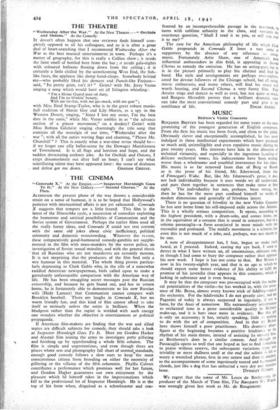THE CINEMA
" Comrade X." At the Empire. " Inspector Hornleigh Goes To It," At the New Gallery. " Second Chorus." At the Plaza.
ALTHOUGH the present phase of the war throws a considerable strain on a sense of humour, it is to be hoped that Hollywood's patience with international affairs is not yet exhausted. Comrade X suggests that tempers are a little frayed.. This film is the latest of the Ninotchka cycle, a succession of comedies exploiting the humorous and satirical possibilities of Communism and the Soviet system of Government. Perhaps the earlier films used all. the really funny ideas, and Comrade X could not rest content with the same old jokes about civic- inefficiency, political solemnity and domestic overcrowding. Whatever the reason, these comparatively good-humoured comedy-gambits are supple- mented in the film with mass-murders by the secret police, an investigation of Soviet sexual morality, and with the general thesis ' that all Russians who are not murderers are certainly morons. It is not WI-prising that the producers of the film find only a wry humour in this material. The whole thing proves particu- larly depressing to Clark Gable who, in the role of a somewhat raddled American- newspaperman, feels called upon to make a garrulously unfavourable comparison with the American way of life. He has been smuggling secret messages past the Russian censorship, and because he gets found out, and has to return home, he is fortunately able to demonstrate to his new Russian wife (Hedy Lamarr) that Communism cannot compare with Brooklyn baseball. There are laughs in Comrade X, but no warm friendly fun, and this kind of film cannot afford to take itself so seriously unless the satire is brilliant. When the bludgeon rather than the rapier is wielded with such energy one wonders whether the objective is entertainment or political propaganda.
If American film-makers are finding that the war and allied topics are difficult subjects for comedy, they should take a look at Inspector Hornleigh Goes To It. Here are Gordon Harker and Alastair Sim joining the army to investigate petty pilfering and finishing up by apprehending a whole fifth column. The film is simple and unpretentious, and even though there are places where sets and photography fall short of normal standards, enough good comedy follows a slow start to keep the most conscientious citizen from brooding on either the enormity of pilfering or the villainy of the fifth columnist. Phyllis Calvert contributes a performance which promises well for her future, and Gordon Ha,kker guarantees our own enjoyment by the pleasure which he himself takes in the impersonations which fall to the professional lot of Inspector Hornleigh. He is at the top of his form when, disguised as a schoolmaster and con- fronted by an incomprehensible passage in the text-book, be turns with sublime urbanity to the class, and ventures the courteous question, " Shall I read it to you, or will you read it to me? "
The case for the American philosophy of life which ad Gable propounds in Comrade X loses a vast army of supporters by the absence of any reference to swing_ music. Fortunately Artie Shaw, one of America's most influential ambassadors in this field, is appearing in Second Chorus to remedy the omission. He has an acting-part, but he is in the picture primarily to play his clarinet and lead his band. His style and arrangements are perhaps over-sophith. cated for devout followers of the Chicago school, but all swing. music enthusiasts, and many others, will find his music well worth hearing, and Second Chorus a very funny film. Fred Astaire sings and dances as well as ever, but not quite so much, and Burgess Meredith proves that a brilliant dramatic actor can take the most conventional comedy part and give Ants y. th. e an


























 Previous page
Previous page